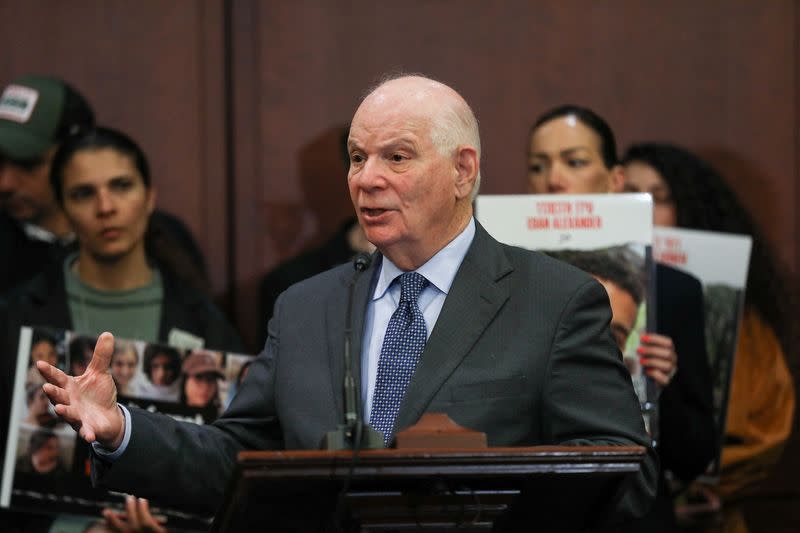US senators question Biden's Yemen strategy, want congressional authorization
- Oops!Something went wrong.Please try again later.
- Oops!Something went wrong.Please try again later.
WASHINGTON (Reuters) - U.S. Democratic and Republican senators on Tuesday questioned President Joe Biden’s strategy to deal with Houthi attacks against commercial shipping and contended he should seek congressional authorization for ongoing military action against the Yemen-based group.
The United States has been carrying out near-daily strikes against the Iran-linked Houthis, who control the most populous parts of Yemen and have said their attacks on shipping are in solidarity with Palestinians as Israel strikes Gaza.
The strikes have so far failed to halt the Houthis' attacks, which have upset global trade and raised shipping rates.
Democratic Senator Tim Kaine said during a congressional hearing with Pentagon and State Department officials that he had serious concerns about the legal authority the Biden administration was relying on for the strikes but also what impact they were having.
"Trying to re-establish deterrence, I don't think you're going to do it if the 200 strikes become 400 strikes, 800 strikes, 1,200 strikes," Kaine said.
"I think you will re-establish deterrence when we get a hostage deal that leads us to a truce, that leads us to humanitarian aid into Gaza, that leads us to the ability to discuss, whatever that truce period is, can be extended," he added.
The Pentagon said on Tuesday that its strikes, which started in January, have so far destroyed or degraded 150 missiles and launchers along with radars, weapons storage areas and drones.
The Houthis said on Tuesday they could only reconsider their missile and drone attacks on international shipping in the Red Sea once Israel ends its "aggression" in the Gaza Strip.
"The Constitution requires Congress to authorize acts of war. ... We swore an oath to follow the Constitution. If we believe this is a just military action and I do, then we should authorize it," Senator Chris Murphy, who chairs the Senate Foreign Relations Committee's Middle East subcommittee.
Murphy, a Democrat, said he would be in talks with his colleagues to introduce such an authorization.
Senator Todd Young, the subcommittee's senior Republican, said he had doubts about the administration's strategy.
"It's imperative that the administration respond to these actions while demonstrating it is both a strategy for deterring aggression and appropriate legal doctrine," said Young. "To date, I have not seen such a strategy put forward."
The U.S. Constitution gives Congress, not the president, the right to authorize war, but provisions in U.S. law give the White House the authority to launch limited foreign military action.
The European Union has launched a naval mission to the Red Sea "to restore and safeguard freedom of navigation."
The United States has a parallel coalition, Operation Prosperity Guardian, aimed at safeguarding commercial traffic from attacks by the Houthis.
U.S. Special Envoy Tim Lenderking told lawmakers during the hearing that China should be "more engaged" in international efforts to halt the Houthi attacks on Red Sea shipping.
"We do see a certain amount of freeloading" by China "that is absolutely unacceptable," he said.
(This story has been refiled to fix a typo in the headline)
(Reporting by Idrees Ali, Jonathan Landay and Patricia Zengerle; editing by Jonathan Oatis)


